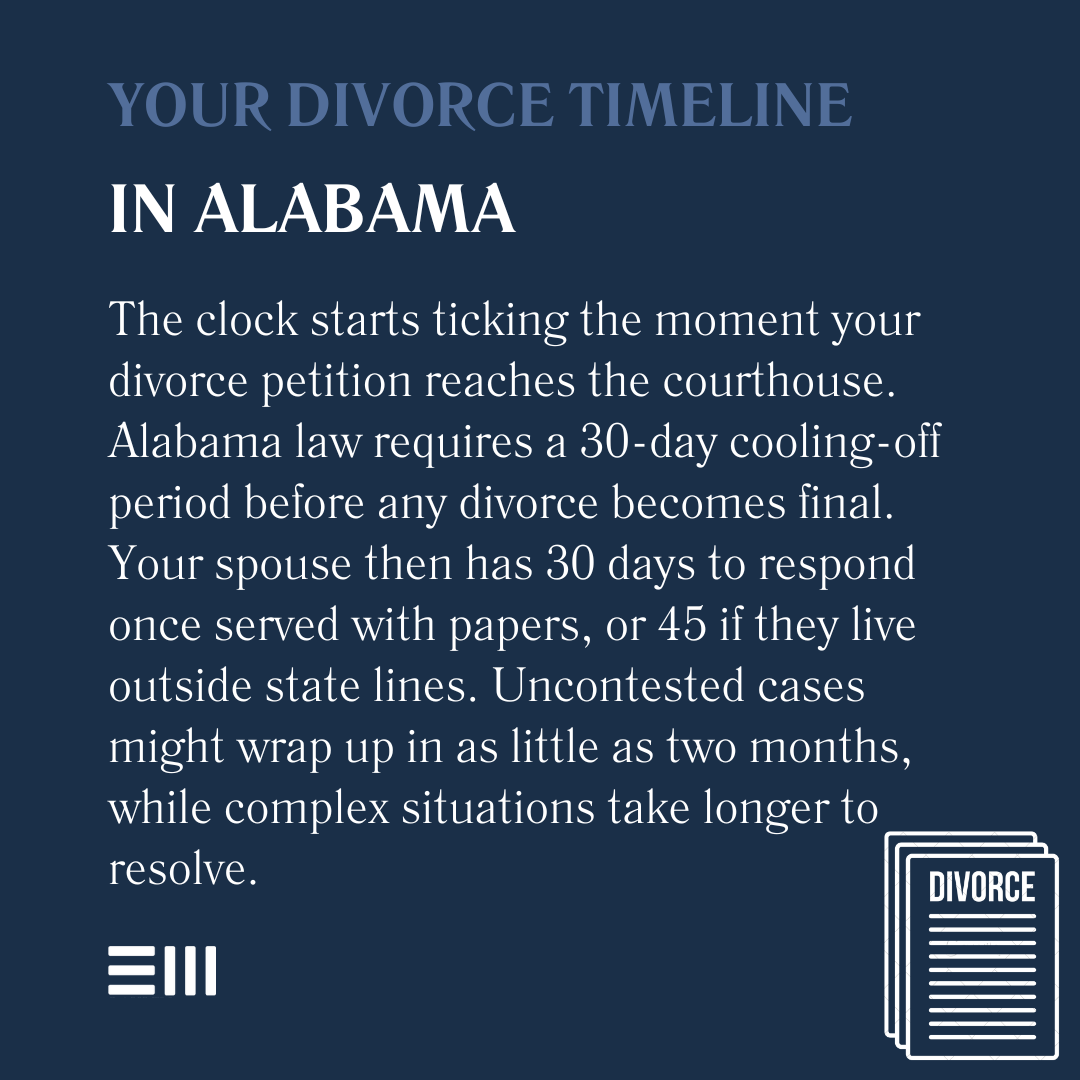Behind the doors of Alabama courthouses, thousands begin their journey toward a new chapter each year. While divorce marks an ending, it also opens the door to new beginnings.
Understanding the path forward empowers you to navigate this transition with clarity and confidence, transforming a complex legal process into manageable steps toward your future.
Step 1: Meet Alabama's Residency Requirements
Before initiating divorce proceedings, Alabama law establishes specific residency criteria to ensure proper jurisdiction over your case.
Understanding these requirements helps prevent delays and complications in your filing process while ensuring your case is heard in the appropriate court.
- At least one spouse must have been an Alabama resident for six months before filing;
- Military members stationed in Alabama for six months qualify for residency, with special provisions for deployed service members;
- The filing must occur in the county where either spouse resides, with some counties offering electronic filing options;
- Non-resident spouses can file if their spouse meets residency requirements;
- Temporary absences from Alabama don't typically affect residency status if you maintain your permanent home here;
- Documentation of residency may include driver's license, voter registration, or utility bills; and
- Military members must provide proof of station orders or military ID.
Meeting these residency requirements establishes your legal right to file for divorce in Alabama courts and sets the foundation for a smooth legal process.
Step 2: Gather Required Documentation
Proper documentation forms the foundation of your divorce filing.
Having these materials organized and readily available streamlines the process and helps prevent unnecessary delays while protecting your interests throughout the proceedings.
- Marriage certificate and any prenuptial agreements;
- Tax returns from the last three years, including all schedules and attachments;
- Bank statements and financial records for joint and individual accounts;
- Property deeds, mortgage documents, and vehicle titles;
- Retirement and investment account statements, including 401(k)s and IRAs;
- Comprehensive list of assets and debts, both joint and separate;
- Income documentation for both spouses, including pay stubs and self-employment records;
- Children's birth certificates and school records (if applicable);
- Insurance policies, including life, health, and property coverage;
- Credit card statements and loan documents;
- Business ownership records and valuations if applicable;
- Recent photographs of property and valuable items; and
- Records of inheritance or gifts received during marriage.
Thorough documentation preparation demonstrates your readiness to proceed and supports your position throughout the divorce process while creating a clear picture of your marital estate.
Step 3: Complete and File a Divorce Petition
The divorce petition officially initiates your case in the Alabama court system.
This critical document outlines your grounds for divorce and desired outcomes, setting the tone for the entire proceeding.
- Choose between fault or no-fault grounds, understanding that fault grounds require specific evidence;
- Complete the Complaint for Divorce form with attention to detail and accuracy;
- Include comprehensive details about property division requests and proposed settlements;
- Address child custody, visitation, and support if applicable, including proposed parenting plans;
- File in the appropriate county courthouse, considering electronic filing options where available;
- Pay required filing fees, which vary by county and complexity of the case;
- Request fee waiver if needed, providing proof of financial hardship;
- Include temporary orders requests for support or protection if necessary;
- Attach all required supporting documentation and forms;
- Make copies of everything for your records and service; and
- Consider filing for temporary relief if immediate court intervention is needed.
Your petition sets the tone for your entire divorce proceeding, making accuracy and completeness essential for protecting your interests.
Step 4: Serve Your Spouse
Legal service ensures your spouse receives official notice of the divorce filing.
Alabama law provides specific methods for proper service of divorce papers, each with its own requirements and timeline implications.
- Personal service through law enforcement or licensed process server, with detailed documentation;
- Certified mail with return receipt, requiring signature confirmation;
- Publication in local newspaper if spouse cannot be located after diligent search;
- Acceptance of service if spouse agrees to receive papers voluntarily;
- Documentation of all service attempt methods and dates;
- Alternative service methods with court approval in special circumstances;
- Proof of service filing with the court once completed;
- International service procedures for spouses living abroad;
- Service through military channels for active duty spouses; and
- Waiver of service if spouse cooperates with the process.
Proper service protects your rights and moves your case forward in compliance with Alabama law, while ensuring due process for all parties involved.
Step 5: Navigate the Waiting Period and Response
Alabama law establishes specific timeframes for divorce proceedings.
Understanding these periods helps set realistic expectations for your case timeline and allows proper preparation for each phase of the process.
- Mandatory 30-day waiting period after filing before final decree;
- Spouse has 30 days to respond after service (45 days if out of state);
- Default judgment possible if no response received within timeframe;
- Settlement negotiations during waiting period to resolve issues;
- Court date scheduling if agreement not reached through negotiation;
- Mediation requirements in certain counties;
- Timeline extensions for complex property division;
- Emergency hearing procedures when necessary;
- Impact of temporary orders on case progression; and
- Options for expedited process in certain circumstances.
Patience during this period allows for proper legal procedures while protecting both parties' rights and interests throughout the divorce process.
Common Questions About Alabama Divorce
Understanding frequent concerns about divorce filing in Alabama helps clarify the process and reduce anxiety about the next steps.
These questions represent the most common concerns raised by individuals beginning the divorce process.
What Are the Grounds for Divorce in Alabama?
Alabama recognizes both fault and no-fault grounds, with incompatibility being the most common basis for filing. Fault grounds include adultery, abandonment, imprisonment, addiction, and mental illness.
How Long Does Divorce Take in Alabama?
Uncontested divorces may complete in 30-60 days after filing, while contested cases can take several months or longer depending on complexity and court schedules.
How Is Property Divided in Alabama?
Alabama follows equitable distribution principles, dividing marital property fairly but not necessarily equally. Factors include marriage length, contributions, and economic circumstances.
Do I Need a Lawyer to File for Divorce?
While self-representation is possible, professional guidance protects your rights and interests, especially in cases involving children, significant assets, or complex legal issues.
What About Child Custody Arrangements?
Courts prioritize children's best interests when determining custody and visitation arrangements, considering factors like stability, education, and relationships with both parents.
After Filing: Next Steps
Once you've initiated divorce proceedings, several important considerations help ensure smooth progression of your case and protect your interests throughout the process.
- Maintain detailed records of all court communications and appearances;
- Follow temporary orders strictly to avoid complications;
- Gather additional documentation as requested by court or counsel;
- Prepare for settlement negotiations with clear objectives;
- Consider mediation options to resolve disputes efficiently;
- Plan for post-divorce transitions including housing and finances;
- Update estate planning documents and beneficiary designations;
- Establish separate financial accounts as permitted;
- Document all communication with your spouse; and
- Create a support system for emotional well-being.
Attention to these details supports positive outcomes throughout your divorce process and helps establish a strong foundation for your future.
Take Control of Your Future Today
Life transitions require both courage and support. Our experienced divorce attorneys understand the complexities of Alabama divorce law and the emotional challenges you face.
We're here to protect your rights, guide you through each step, and help you build the foundation for your next chapter.
Contact us for a confidential consultation and discover how we can help you navigate your divorce with confidence and dignity.


